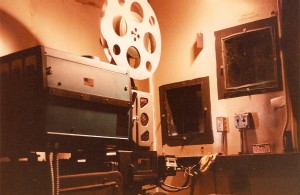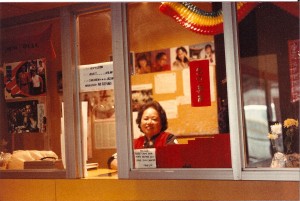Thanks to Jean Lukitsh, Films at the Gate curator, for sharing this entry about Chinatown’s old movie houses. More photos and theater memorabila here (via Flickr).
 When I came to Boston in 1978, there were three Chinese-language movie theaters in Chinatown: the Star, the China, and the Pagoda. The Star, on Essex St. at Harrison Ave., and the China, on Beach St. near the Gate, were owned by Mr. Stanley Wong. The Pagoda was on Washington St. It’s now the Empire Garden restaurant.
When I came to Boston in 1978, there were three Chinese-language movie theaters in Chinatown: the Star, the China, and the Pagoda. The Star, on Essex St. at Harrison Ave., and the China, on Beach St. near the Gate, were owned by Mr. Stanley Wong. The Pagoda was on Washington St. It’s now the Empire Garden restaurant.
One of the projectionists from the China studied tai chi with my teacher. I was looking for a job and I loved movies. Someone was leaving the Star in a couple of months, and I was able to take his place. That turned out to be the best job I ever had!
 The Star was an old vaudeville theater that had been partitioned at some time into two side-by-side screens. The original theater was so big that the subdivided spaces were still sizable rooms. At ï¬rst, only the left side was used. It showed movies from the giant Shaw Brothers studio in Hong Kong. Around 1983, the right side was restored and opened, and indie movies from Hong Kong, like the Cinema City and Film Workshop productions, ran there. The China, tucked under a parking garage where the Hei La Moon restaurant is now, specialized in Taiwanese ï¬lms. From 1979 to 1986, I worked at both the Star and the China, running double features on all screens in programs that changed weekly.
The Star was an old vaudeville theater that had been partitioned at some time into two side-by-side screens. The original theater was so big that the subdivided spaces were still sizable rooms. At ï¬rst, only the left side was used. It showed movies from the giant Shaw Brothers studio in Hong Kong. Around 1983, the right side was restored and opened, and indie movies from Hong Kong, like the Cinema City and Film Workshop productions, ran there. The China, tucked under a parking garage where the Hei La Moon restaurant is now, specialized in Taiwanese ï¬lms. From 1979 to 1986, I worked at both the Star and the China, running double features on all screens in programs that changed weekly.
The ones that made an impression on me back then were Lau Kar-leung’s kung fu epics like SHAOLIN MANTIS, 36TH CHAMBER OF SHAOLIN, and MY YOUNG AUNTIE, Shaw studio wuxia ï¬lms like THE LADY HERMIT and JADE TIGER, and Jackie Chan’s early kung fu comedies: FEARLESS HYENA, DRUNKEN MASTER, and YOUNG MAS- TER. I have to confess, though, that those last two ï¬lms played at the Pagoda. Not one of my boss’ theaters. But I went there, paid for a ticket, and spent my day off in a Chinese theater, watching yet another kung fu movie.
As little mom-and-pop video stores appeared all over Chinatown in the late 1980s, the theaters lost their audiences and closed down. It was cheaper for a whole family to rent a video instead of buying tickets. In some ways, the new video technology is good. It’s made Asian ï¬lm available to a wider audience, and has helped to preserve old ï¬lms that otherwise may disappear or be forgotten. But the community lost a space where people used to come together and sit for a couple of hours, see old friends and get caught up with each others’ lives.
 Jean Lukitsh is the curator of the Films at the Gate series. Jean is a former resident of Chinatown, and was the projectionist for two of the three cinemas that existed in Boston’s Chinatown in the 70s and 80s. Jean is a regular contributor to the popular website Kung Fu Cinema, a student of local wushu Master Bow Sim Mark, and a martial arts teacher in Boston.
Jean Lukitsh is the curator of the Films at the Gate series. Jean is a former resident of Chinatown, and was the projectionist for two of the three cinemas that existed in Boston’s Chinatown in the 70s and 80s. Jean is a regular contributor to the popular website Kung Fu Cinema, a student of local wushu Master Bow Sim Mark, and a martial arts teacher in Boston.
